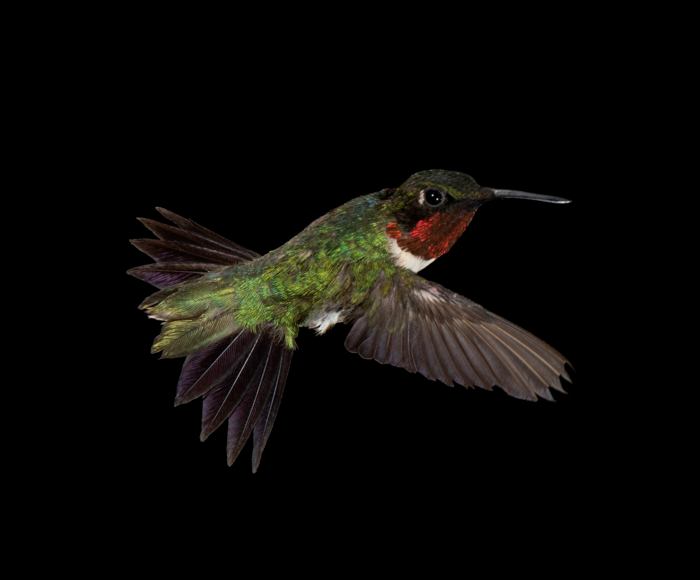According to a recent study published in eLife, ruby-throated hummingbirds use energy-saving tactics to survive overnight fasts as well as build fat stores that will enable them to travel on long migrations.
 An adult male ruby-throated hummingbird in flight. Image Credit: Brock and Sherri Fenton.
An adult male ruby-throated hummingbird in flight. Image Credit: Brock and Sherri Fenton.
It has been a long-held suspicion among researchers who work on hummingbirds. However, this study adds to the growing body of evidence. The study also offers new insights into how birds decide whether to conserve energy or store fat.
Ruby-throated hummingbirds rely on sugary nectar to keep their wings moving rapidly so they can hover in the air. As part of their overnight fasts, birds can shift into torpor, an energy-saving mode that lowers their body temperature and slows down their metabolism by nearly 95%.
We wanted to know if hummingbirds use this same energy-saving mechanism to more quickly build the fat stores they’ll use to power their 5,000-kilometre migrations between their North American breeding grounds and Central American winter homes.
Erich Eberts, Study First Author and PhD Student, Welch Lab, University of Toronto Scarborough
To determine how and when the ruby-throated hummingbirds employ this energy-saving mode, Eberts and his team quantified the everyday changes in the bodies, fats and muscles of 16 hummingbirds during three periods: the breeding season, late summer while preparing for migration and during the typical migration period. A technique called respirometry was also used to monitor the oxygen consumption of the birds to identify when they entered into torpor.
In the breeding season, the hummingbirds maintain lean body mass and enter into torpor only when their fat stores drop below 5% of their body mass. Such an “energy-emergency strategy” was usually used on nights when they did not have enough energy reserves before they go to sleep.
However, in the late summer, when the birds essentially increase their body mass by 20% to support themselves during the long migration, they abandon the 5% threshold for entering torpor. Rather, they shifted to torpor more often and at greater fat levels. This enables them to preserve energy and store fat even though the nights get prolonged.
We’ve shown that hummingbirds abandon the energy-emergency strategy in the late summer and start using torpor to accumulate the fat stores they need for migration.
Erich Eberts, Study First Author and PhD Student, Welch Lab, University of Toronto Scarborough
Researchers suggest that further study of this energy-saving strategy may be beneficial for the conservation of ruby-throated hummingbirds and other migrating bird species, which are facing more and more environmental stress due to habitat loss and climate change.
Our findings that hummingbirds can use torpor to cope with different energetic challenges throughout the annual cycle are important for understanding differences in how these and other migratory animals that don’t use torpor might respond to future environmental changes in food availability and temperature.
Kenneth Welch Jr, Associate Professor and Acting Chair, Department of Biological Sciences, University of Toronto Scarborough
Welch is also a co-author of the study along with Christopher Guglielmo, Professor at the University of Western Ontario, Canada.
Journal Reference:
Eberts, E. R., et al. (2021) Reversal of the adipostat control of torpor during migration in hummingbirds. eLife. doi.org/10.7554/eLife.70062.
Source: https://elifesciences.org/